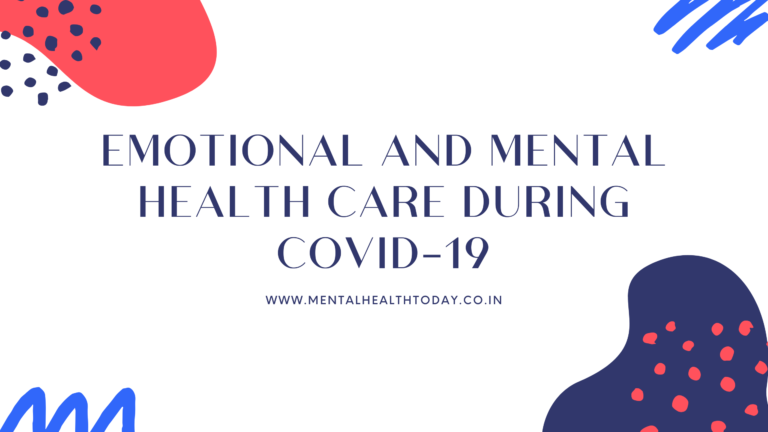It is a critical time for people across the globe. Moreover, India is at a crucial phase of the pandemic created by coronavirus. Therefore addressing the effect of this change on our mental health is also important. In such chaotic times, it is common to face anxiety regarding our health and well-being of others. Also, due to quarantine, coping with social distancing can become emotionally and psychologically taxing. And lastly, full time parenting can become more challenging during times like these. Therefore, this article aims to address these problems and try to provide solutions for some mental health and emotional issues caused by COVID-19.
Coping with Social Distancing
Social distancing is relatively a new challenge or obstacle that is faced by the current generations. Due to the highly contagious nature of the virus, it is necessary for everybody to undertake this precaution. Social distancing can lead to a spectrum of emotions such as fear, anxiety, anger, frustration, depression and boredom.
Staying connected with people is highly recommended if you feel or are vulnerable to feel such emotions. Video or voice calling or sharing posts/memes on whatsapp, facebook or skype to your friends from college or work can help you stay connected and regulate your emotions. Acknowledging the adversity rather than denying it can be helpful in dealing with the COVID-19 stress. In the time of such a crisis, it is important to manage and limit our news intake. Checking the news once or twice a day from credible sources is a good measure that can be taken here.
Other activities that can be taken up during quarantine are trying new recipes at home, cleaning and organizing your home and workplace, exercising, journaling and meditation. Some more productive measures are joining an online class/course, reading a book, working from home and preparing yourself for this new change rather than panicking.
Mental Health Care
One cannot simply ignore the impact of such global chaos on an individual’s mental health. As we know, people with mental illnesses such as anxiety, panic disorder, hypochondriasis, obsessive compulsive disorder and even trauma might find taking care of their mental health challenging. Some tips and techniques from below can help them to be more able.
Developing and maintaining a routine during quarantine can be very helpful in reducing negative symptoms. Reducing exposure to media and news is also essential for those whose mood and behaviour is affected afterwards. Staying connected with your therapist through voice or video call can help alleviate some symptoms of mental distress. Moreover, it is essential to continue taking medications for your mental illness as prescribed by the doctor. Find positive stories from survivors of the virus and use it to amplify and boost your mood.
Parenting Tips during Quarantine
Since it is required to quarantine, many parents are asked to work from home and most of the schools are shut which means children are also home along with their parents. This can again lead to a lot of distress, physically and emotionally. Therefore, managing children during this critical time can be more overwhelming than otherwise.
The importance of maintaining a routine for children and parents both cannot be emphasized enough. A schedule or routine helps reduce emotional and physical distress as well as keep one productively active. Likewise, playtime should also be scheduled, although it can be for a longer time than usual. Many cancellations of events are taking place due to COVID-19. Pointing out these changes to your children well in advance can help reduce their anger and disappointments. Reframing the scenario is another approach that can help reduce the tension of parenting. Instead of being continuously worried about taking care of your children, you can reframe the situation by considering it a good opportunity to spend quality time with your children which can promote their growth and learning.
And lastly, it is most important to take care of yourself. In case of an overwhelming situation, take steps to calm yourself before calming down your children. Being honest than faking about your mood and energy to your children can be more helpful.
The spread of coronavirus has led to a lot of distress across the globe. People and families affected by it are facing the most distress. Taking helpful measures such as social distancing and maintaining cleanliness and hygiene should not be ignored. Amidst this chaos, we hope to support your mental health needs as much as possible.
Sources:
https://www.who.int/docs/default-source/coronaviruse/mental-health-considerations.pdf
https://www.psychologytoday.com/intl/blog/little-house-calls/202003/parenting-during-covid-19


